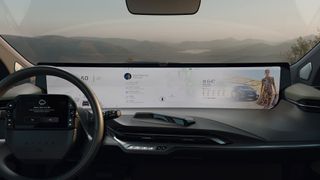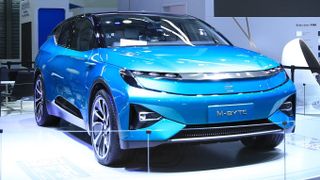
Foxconn, the major manufacturing supplier to Apple and Tesla, has partnered with Chinese startup Byton to help produce the company’s first electric vehicle, the M-Byte.
The deal could prove an important lifeline for the car manufacturer, which is struggling to produce its first vehicle having unveiled its M-Byte concept car several years ago, and marks a strategic move for Foxconn as it looks to build on its existing presence in the auto industry.
When Byton first revealed its electric SUV at CES 2018, it was clear the Chinese company had invested heavily in the technology and interior aesthetic of the vehicle in an attempt to stand out from the EV crowd. A 48-inch full-width display – plus screens for each of the rear passengers – was, at the time, the jewel in the M-Byte’s crown, along with facial recognition software to tailor the driver’s seat position to a personal profile and voice control to ensure a totally-hands free UI.
- The Byton M-Byte isn't just a car – it's a 'smart device on wheels'
- Mercedes to unveil ultrawide 'Hyperscreen' at CES 2021
- Tesla will make its fully autonomous mode accessible to more drivers
Two years on from its initial announcement, the M-Byte still hasn’t arrived, and it’s a more crowded market than ever – Tesla, for instance, recently announced a record-breaking year in 2020. But Byton is still betting on its vision, with its first vehicles now set to hit the road in 2022 having partnered with Foxconn to accelerate production. The Taiwanese manufacturing giant’s $200 million investment – and its long history of building iPhones for Apple and supplying parts to Tesla – will be a welcome one.
New updates suggest the vehicle is set to retail at $45,000 (around £34,000) for the basic model – that’s $10,000 (or around £7,000) cheaper than Tesla’s least expensive offering, the Model 3 – which sets the M-Byte apart as a relatively affordable SUV, given the promises of the technology inside it.
It’s also worth noting that Byton is planning to offer two powertrain options to customers: a rear-wheel drive model with a 72 kilowatt-hour battery pack (for an estimated 224 miles of range), and an all-wheel drive model that includes a larger 95 kWh battery pack (for approximately 270 miles of range).

It’s unclear whether the vehicle will implement the entire range of smart features previously suggested – autonomous driving and car-to-car communication software, for example – but it seems reasonable to assume that its lower cost will come at the expense of the glossier features included in upcoming competitor EVs, like the Mercedes-Benz EQS electric sedan. Concept images from several years ago still appear ambitious even in today’s market, so it will be interesting to see the finished product come 2022.
Get daily insight, inspiration and deals in your inbox
Get the hottest deals available in your inbox plus news, reviews, opinion, analysis and more from the TechRadar team.
Could this be China’s first successful automotive export to the world? Foxconn previously revealed plans for its own electric car, and Apple itself is already working on in-house car technology for the company’s inevitable foray into the auto industry, so the jury is out on whether Byton can deliver its attractive, affordable offering in time for buyers to take notice.
In any case, the EV revolution isn’t coming – it’s already here.
- Everything you need to know about electric vehicles

Axel is a London-based Senior Staff Writer at TechRadar, reporting on everything from the latest Apple developments to newest movies as part of the site's daily news output. Having previously written for publications including Esquire and FourFourTwo, Axel is well-versed in the applications of technology beyond the desktop, and his coverage extends from general reporting and analysis to in-depth interviews and opinion.
Axel studied for a degree in English Literature at the University of Warwick before joining TechRadar in 2020, where he then earned an NCTJ qualification as part of the company’s inaugural digital training scheme.
